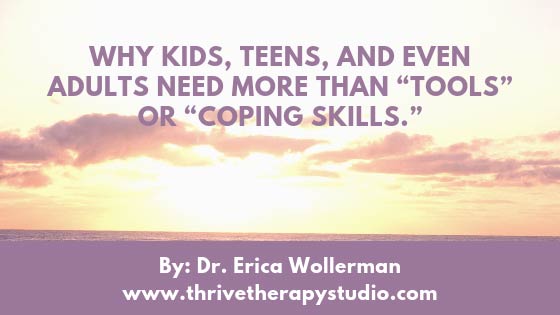Why kids, teens, and even adults need more than “tools” or “coping skills.”

We get a lot of calls from people who share their current challenges and concerns and jump pretty quickly to what they want and believe they need. Tools. Coping Skills. Strategies.
I find this interesting as a therapist who generally engages in very deep, complex work with my clients. Even with my clients who initially thought that they just wanted some “tools,” we also do some pretty deep work in understanding how their challenges came to be before we move on to tools. I believe in doing therapy in a way that you will hopefully get some tools and strategies to manage your life or symptoms more effectively, but also gain a deeper understanding of yourself, relationships with others, and higher levels of self-compassion.
Some may wonder why this is a goal… I am of the belief that most of the things in our lives that we want “tools” to fix, are not as simple as they seem. For example, someone may want help making changes in the way that they use alcohol. Simple, right? Just stop drinking so much? Actually, this “simple” challenge is so complex once you get into exploring it. You need to consider why you drink, what alcohol symbolically represents in your life or self, what it does in your relationships to yourself and others, what habits you have around drinking, why you continue drinking, how successful you think you will be in stopping, and what feelings you might be using alcohol to either mask or cope with. There is so much to explore, understand, and process as people. Unfortunately, our quick fix culture has us reaching for quick fixes even in therapy. We want quick tools or strategies to manage our problems or challenges, rather than going inward to consider what is really going on in our lives.
This is true for children too. Parents want their children to cope with stress better, especially in the teen years. And boy, do we have some really stressed out teens in our culture! It breaks my heart but that’s a different topic. So, we get calls from parents who want their teen to learn tools to manage stress. First, we need to understand the stress and explore it. Often, I find the stressed out teens I work with have completely unrealistic expectations of themselves to be perfect, or always on top of things, or to get into impossible schools. So, we need to explore those expectations, how they develop, what might be more realistic for them, or how to think about their goals in a more effective way. This is SO much more than tools. This is self-understanding and growth that will go a long way when that teen or child has challenges later in their life.
My belief is that just stopping at providing tools or strategies for my clients is a short-term fix. It will probably work for a while and then some of the same things will come back up either in the same way, or different ways. I believe this is because often our symptoms or bad habits are products of a deeper challenge in meeting our emotional needs. In that deep, complex understanding of ourselves, we can truly figure out what is going on and how to take steps towards living a different life.
Reach out to start
your healing journey

